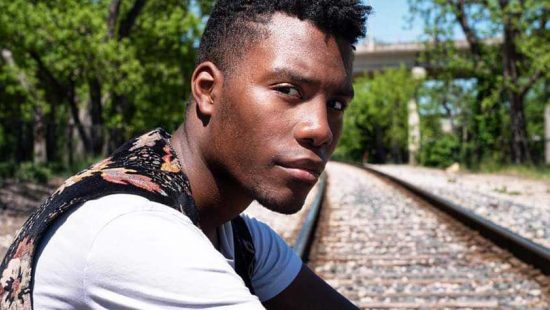When Chris Hills sits down with Valerie Lopez for this week’s episode, it’s hard not to fall fast for the subtle southern drawl that accompanies the stories he tells. There is an immediate openness and honesty in his tones that drives a sense of intimacy, something that no doubt helped propel him to the Funniest Person in Austin Semi-finals this year. His chordal capabilities also play a big role in another of his passions: he’s also an accomplished beatboxer.
Hailing from Grand Prairie, Texas, a small-ish town near Dallas, Hills recognizes it wasn’t the most riveting scene growing up, but notes it’s “turning up now”, and has a “poppin’ Walmart”. He falls in the mold of comedians that seized on their future profession in childhood. At age 8, he was already aware of the industry, by way of being a class clown, and a serendipitous class project that introduced him to then star Bill Cosby. “I knew of comedy, but I didn’t even know what comedy was,” he says, more cognizant of the act of performing and getting a laugh, than identifying it as an art form and career.
Hills didn’t limit his audience to those captive in the classroom (and his teacher), taking a turn at stage plays in high school. It cemented his burgeoning love affair with storytelling. “I loved acting, love being able to be somebody else,” he says of the realization.
I loved acting, love being able to be somebody else
Chris Hills
Hills’s first college attempt held his interest for “about 2 seconds” he says (which turns out in Hill-time to be about 3 years); the culture and scene didn’t suit him, but he found a “safe haven” in the theater department there. A change of scene was in order, which brought him to Texas State, a place that felt much more like a home.
Going into the transition, Hills didn’t even know if there would be a welcoming place for his comedic ambitions, but was determined to create one if not. As it happens, San Marcos had a tight little scene – which is still growing – but ultimately provided the stepping stone (both in proximity and progression) to Austin.
I teased beatboxing as part of Hills’s repertoire right out of the gate, but have left you hanging for more than a few beats at this point. Beatboxing can be inherently spontaneous, and that’s a narrative that threads directly through his comedy methodology. Hill admits he rarely writes, or records, his sets, often choosing a topic at an open mic barely in advance of hitting the stage. He’ll often grab an idea that happens to be in the fore of his mind, and decides, “I’m about to just go and try this out.”
It’s a tough trick to pull off, but for those that can do it, a conversational style quickly emerges that can be nearly impossible to fake. Risk isn’t always rewarded with these endeavors, as Hills recounts more than a couple of times that it backfired. “When I failed, it was because I was trying to do something new, instead of being myself,” he recounts of one such instance at FPIA, but even in the midst of potential disaster, called on his ability to spin into a rant to power through.
When I failed, it was because I was trying to do something new, instead of being myself
Chris Hills
What beatboxing brings to Hills’s comedy is only part of the picture; it’s also begun driving an interest in creating more complex musical pieces. In unfamiliar territory, he’s doing what he does well once he has a goal in mind: networking and building skills, like learning to play guitar. He has an ambitious project in mind, but says it’s going to be on the back burner for a little bit, opting to try to release smaller pieces while he explores styles and refines his talents. All this, while also angling to get more exposure on video and film. When he calls up examples like Childish Gambino, it’s clear that he sees putting more of these challenges on his plate isn’t a chore; it’s a gateway to generating a substantive, varied, and respected body of work.
It’s not easy to predict what the future holds for someone so spontaneous, but Hills tips that he definitely has ideas in waiting, like putting together a show that ties performers’ sets with a required musical number. It wouldn’t be the first show to attempt such a meld, but he’d love to create one to bring his own style and signature to it.
As he puts it, “My goal for next year is it’s kind of like doing a lot more for myself as an artist, and not sitting around waiting.” All this planning ahead suggests Chris Hills knows that, sometimes, the best way to go off the cuff is to be ready for anything.
Catch more of Chris Hills at:
- The Year In Review — Cap City Comedy Club Saturday 12⁄29 8pm
- 50 First Jokes — Spiderhouse Ballroom Saturday 1⁄4 9pm

